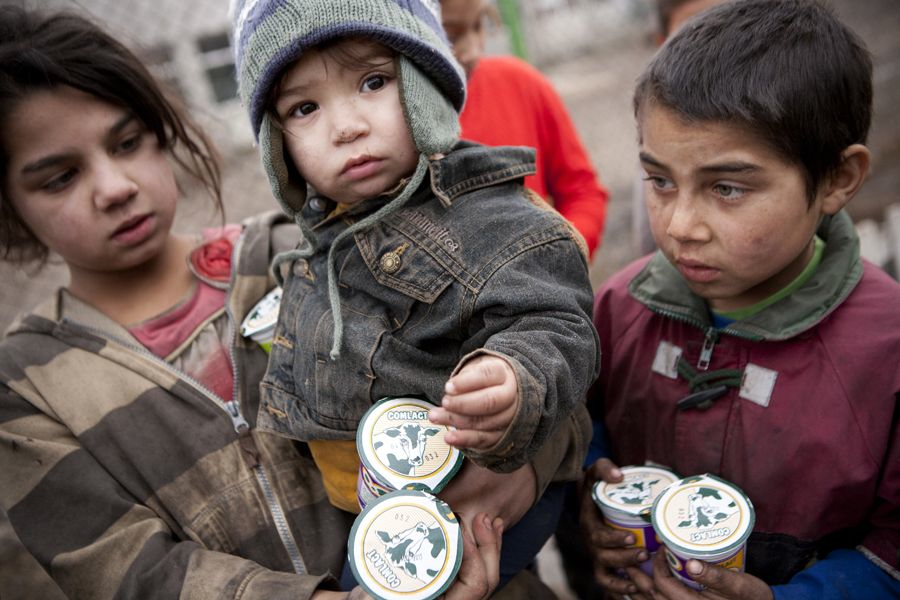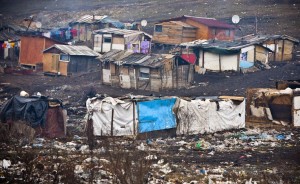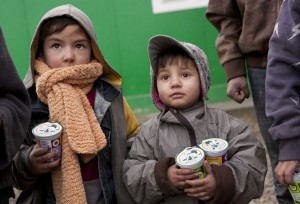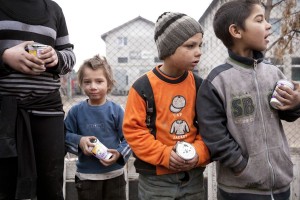 Children in Pata Rat, Romania, receive a gift of yogurt from Heifer farmers.
Children in Pata Rat, Romania, receive a gift of yogurt from Heifer farmers.Story by Katya Cengel; photos by Geoff Oliver Bugbee. Katya and Geoff are visiting Heifer projects in Romania and Armenia this week for Heifer's World Ark magazine.
PATA RAT, Romania—In the valley below a landfill, on the edge of the Transylvanian city of Cluj-Napoca, sits a small slab structure. Chickens peck at the muddy yard out front and dogs play amid old tires and an even older scooter. In the corner of Marian Tomita's yard are stacked nine trays filled with 20 yogurts each. Tomita lives just outside the settlement of Pata Rat, the largest Roma community in the Cluj region.
 Pata Rat, Romania
Pata Rat, RomaniaFounded after the 1989 revolution which saw the overthrow and execution of communist dictator Nicolae Ceau?escu, the settlement is home to around 700 Roma, or gypsies. They live in wood shacks on the trash-strewn hills that surround a landfill. For the last five years, Heifer Romania field assistant George Abrudan has brought milk and yogurt to the children every month. The dairy products are donated through Farmers Feed the Children, a Heifer program which provides cows to impoverished farmers who then donate a portion of their milk to orphans and others in need, like this Roma community.
Usually Abrudan shows up in a truck loaded with yogurts and milk, but on this gray February morning he has only 180 yogurts. He hasn't visited since before Christmas and Tomita greets him with a warm smile. Unemployment is high in the village, says Tomita.
"When they see we are Roma they say they don't have places for us," he says.
 Illiteracy also makes it difficult for many members of the community to find employment, with the majority having completed only four years of grade school, says Tomita. He cares for a church built by a charitable organization out of the Netherlands and provides the children with a warm meal every Thursday.
Illiteracy also makes it difficult for many members of the community to find employment, with the majority having completed only four years of grade school, says Tomita. He cares for a church built by a charitable organization out of the Netherlands and provides the children with a warm meal every Thursday.
It is mid-morning, but still early in the community, and news of the yogurts spreads slowly. The children arrive in ones and twos and then threes and fours, the older ones holding the younger ones' hands. Tomita lines them up against the wall and hands them each a yogurt. They remain where they are, hoping he will hand them another. One little boy of about 10 years old zips several into the chest of his well worn snowsuit; a girl maybe 9 years old wants to know when Abrudan will bring milk. She is thin, like all the others, and suffers from an upset stomach.
Cassandra doesn't ask for anything, just waits patiently with one little brother balanced on her hip and another at her side. She is 10 years old and does not attend school. At Christmas someone gave the family of 10 several oranges and bananas, but usually they survive on potato or noodle soup.
 Yogurts cradled gingerly in their small hands, the children head back down the road toward a hill dotted with one-room wood and plastic shacks. Crows and dogs scavenge amongst plastic bottles. Garbage trucks barrel toward the landfill over the hill where the children's parents search for scrap metal to sell. In Tomita's yard only the cardboard cartons that carried the yogurts remain.
Yogurts cradled gingerly in their small hands, the children head back down the road toward a hill dotted with one-room wood and plastic shacks. Crows and dogs scavenge amongst plastic bottles. Garbage trucks barrel toward the landfill over the hill where the children's parents search for scrap metal to sell. In Tomita's yard only the cardboard cartons that carried the yogurts remain.
"One hundred yogurts are not enough," says Tomita. "You have to come with 500 or 600."
He is inside his home now, looking out the window where he can see two small boys headed toward his door. The children will keep coming, asking for yogurts that are not there, and won't be there until next month, when Abrudan returns.